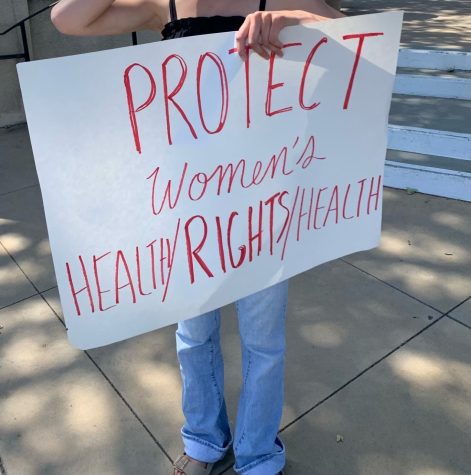Climate Change Will Soldier On With No Regard For Climate Strikes
On Friday, Sept. 20, people all over the world gathered to protest one of the most prevalent issues of today: climate change. What distinguished this particular demonstration from the hundreds of others that have been held was not the vast number of participants or the global scale, but the protesters themselves. Students were the ones with signs in front of city halls and on the streets. It was a dramatic change in the battle over global warming that signals the feelings of the younger generation. Greta Thunberg, who is considered to be the face of the youth movement, addressed leaders at the United Nations on Monday, Sept. 23, three days after the protest.
“You have stolen my dreams and my childhood with your empty words,” Thunberg said. “And yet I’m one of the lucky ones. People are suffering… Entire ecosystems are collapsing. We are in the beginning of a mass extinction, and all you can talk about is money and fairy tales of eternal economic growth. How dare you!”
These words sparked praise among those in the climate change movement. It echoed sentiments felt about the severity of the issue and the inaction that world leaders have shown. However, protesting can only do so much. The difficulty in tackling global warming is not awareness, but rather solutions. People all over the world have heard of climate change; the recent Climate Strike is evidence of this. Some would point to climate change deniers, but the reality is protesting will not change anyone’s mind. The recent tone put forward by the Climate Change movement is not helpful. The effects of climate change are catastrophic, but blaming others is not the right path.
“You are failing us,” Greta said. “But the young people are starting to understand your betrayal… And if you choose to fail us, I say: We will never forgive you.”
The solutions to climate change are not easy ones, and world leaders understand this. The age old adages of recycling, walking instead of driving, and turning off the lights are good advice, but when it comes to drastically reducing carbon emissions, the task becomes more difficult. As reported by Forbes, many do not realize how prevalent fossil fuels are. Petrochemicals, chemicals obtained from petroleum, are used in a variety of everyday products, such as plastics and clothing.
“Petrochemicals are the building blocks that are essential to making the goods that make modern life possible,” writes the American Fuel & Petrochemical Manufacturers (AFPM), an American Trade Association.
While the AFPM is not a big supporter in the fight against climate change, it is hard to deny the validity of their statement. Even many of the renewable energies pointed to as the future depend on fossil fuels for their creation. Another issue is that of developing countries. Romany Webb, an expert on climate law at Columbia Law School, has highlighted the difficulty of phasing out fossil fuel usage in these areas.
“Many African nations are heavily dependent on fossil fuel development for their economic growth and argue that, to continue growing, they must further develop their resources to bring power to the masses,” wrote Webb. “In sub-Saharan Africa, an estimated 620 million people, equivalent to two-thirds of the population, live without electricity. Major new fossil fuel discoveries throughout the region, including in Mozambique, Tanzania and Uganda, could enable them to close the gap.”
The Global Climate Strike was a failure in two aspects. After all the effort, coordination, and passion put behind the protests, there needed to be a sign that it had worked. People understand global warming is dangerous, but when it comes to determining its importance, other problems tend to come first. A Pew Research Poll conducted earlier this year showed that the American public ranked the economy, healthcare, and education as the most important issues for the government to focus on. Climate change came second to last, just ahead of global trade. People are concerned about what affects them now, but global warming is long term. Protests will not change opinion. Rather, they will temporarily rally support, like what was seen at the Global Climate Strike. People can set a day out of their schedule to support what is seen as a prevalent issue, but how many will still push for legislation a month from now? Leaders are going to focus on the issues that the public wants addressed, of which climate change is not a priority.
The protests were also met with some ridicule from the right. In his opinion piece on The National Review, Rich Lowry expressed his reasoning on why the youth generation should not be listened to.
“There’s a reason we don’t look to teenagers for guidance on fraught issues of public policy,” said Lowry. “With very rare exceptions, kids have nothing interesting to say to us. They just repeat back what they have been told by adults, with less nuance and maturity.”
This is a controversial take, but Lowry’s words have a seed of truth. There is little in solutions provided from the protesters, kids or otherwise. Are leaders like Donald Trump and Xi Jinping suddenly going to support environmental policy because of protests? What the world needs is not complaints, but people looking to create change. This idea has seen some support in CHS. Senior Roark Chao shared his philosophy towards global warming.
“Many people talk about how they want to make change and how protesting does this for them,” Chao said. “I understand that, I support that entirely. But at the end of the day, research and experimentation is what makes the change happen.”
Chao also shared some of his forays into science and his personal research into the issue of climate change. He has been experimenting with food to create a biodegradable plastic.
“What I’m trying to prove is that we can use food waste as a legitimate alternative to plastic,” Chao said.
This type of work in the scientific field signifies Chao’s dedication towards solutions that work. In the end, the ones who stop climate change will not be the protesters. They will be the scientists, economists, and politicians who work together to find a solution. If we are to come to a final resolution to the problem, it will require working together, acknowledging the difficult task that faces us, and mutual respect. Where Chao and the protesters agree on is one important point: we have to take action.
Hello there! Our goal is to provide relavent, engaging journalism for readers of all ages. Your donation will support the student journalists of the Wolfpacket at Claremont High School, and will allow us to purchase equipment, print our monthly issues, and enter in journalism competitions. We appreciate your consideration!

Stephen Nazareth is a senior at Claremont High School and a first-year reporter at the Wolfpacket. He also manages the Wolfpacket website. In his free...








